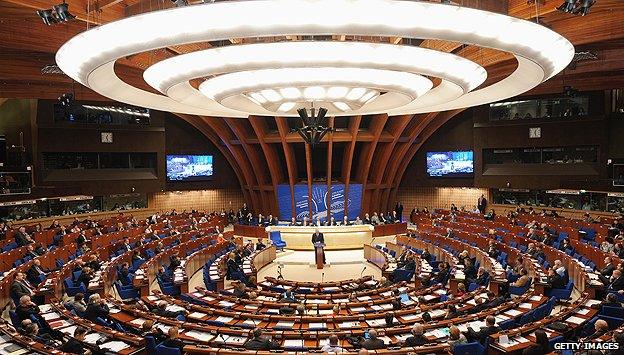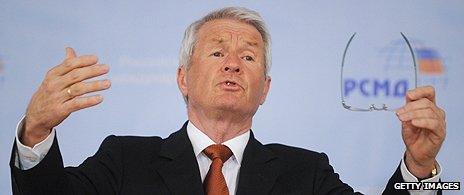What is the Council of Europe?
- Published

The Council of Europe emerged from the ashes of the Second World War
The Council of Europe, Europe's oldest political body, aims to uphold human rights, democracy and the rule of law across the continent.
It emerged in 1949 from the ashes of World War II and now includes all European countries apart from Belarus, where the council is concerned about the human rights situation, and Kosovo, the independence of which is not recognised by many Council of Europe members.
Members must respect the rights and freedoms laid out in the body's treaties, including its centrepiece, the European Convention on Human Rights. The council oversees and enforces rulings made by the European Court of Human Rights, which considers cases brought by individuals and groups against the signatories to the convention.
Pre-occupied with terror
After 1989 the council gained a new political focus with the accession of Europe's post-communist democracies. Russia in particular promised to make significant reforms to allay concerns about human rights and its judicial system.
Lately, the council has become preoccupied with the problems of terrorism, organised crime, money laundering and human trafficking. Its broad remit also includes the fields of education, the environment, health and culture.
The treatment of terror suspects has in recent years received considerable attention from the council. In 2006, it published a report into allegations of secret CIA detention centres in Europe which concluded that Council of Europe member states had colluded in this system.
Funding comes from member states; their contributions are determined according to wealth and population. The council is a stand-alone body, and not a branch of the European Union.
A secretary-general has described the council's work as "low key and gentle; it does not make headlines".
Structure

Secretary-general Thorbjoern Jagland has overall responsibility for the council's work
Secretary-general: Has overall responsibility for the council's work and its budget and is elected to a five-year term by the Parliamentary Assembly. Thorbjoern Jagland, a former prime minister of Norway, took up the post in October 2009.
Commissioner for Human Rights: A post set up in 1999 to promote human rights and identify legal shortcomings to this. Elected by the Parliamentary Assembly.
Committee of Ministers: Decision-making body, consisting of the foreign ministers of member states.
Parliamentary Assembly: Comprising 630 MPs from member states, it meets four times a year to debate matters of current concern and to offer guidance to the Committee of Ministers. Representation is based on the population size of member countries. Political groupings, reflecting ideology rather than nationality, have emerged.
Congress of Local and Regional Authorities: A forum for local elected representatives, it has a key role in helping recently-joined member states.
Issues
There is concern inside and outside the Council of Europe that its work overlaps with that of other pan-European bodies, including the European Union and the Organization for Security and Cooperation in Europe (OSCE). The EU plans to enhance the role of its anti-racism body to monitor certain types of human rights abuses.
Critics accuse the council of being a talking shop with little power, other than mild diplomatic pressure, to halt rights abuses.